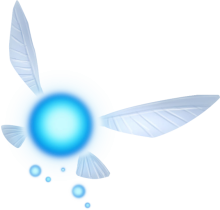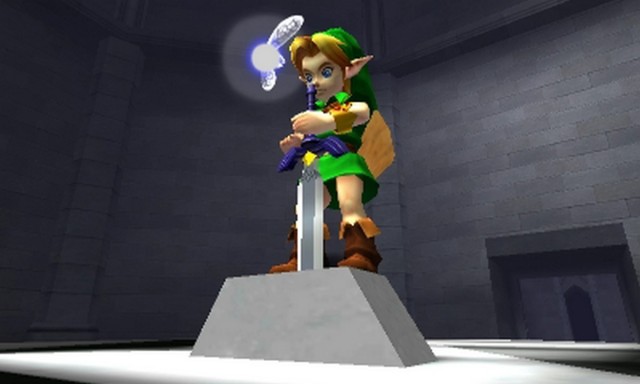Is Navi really a pest?
Posted on September 21 2013 by Parker
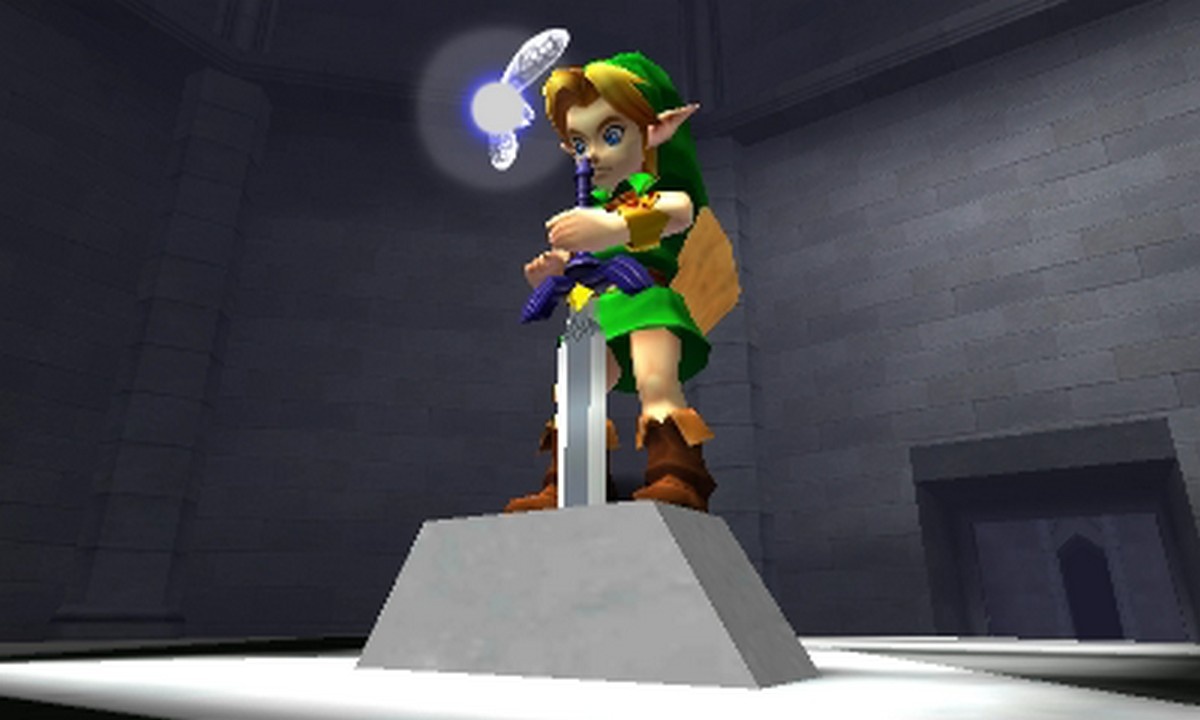
Who could have predicted in 1998 that these two innocent words, articulated by a winged ball of light, would become the bane of countless Zelda fans? Yet besides Kaepora Gaebora’s notoriously long-winded speeches, the infamous catchphrase of Link’s fairy companion Navi is probably the most common points of criticism leveled at Ocarina of Time. Detractors claim her often-repeated exclamations are unbearable; her personality obnoxious. Not even Tingle is demonized to such an extent.
When faced with such vocal and ingrained opinions about a character, the first impulse is to go with the crowd. It’s essential, however, to overcome this urge. Popular opinions should be challenged, especially when they have reached almost universal acceptance. Doing so helps separate an opinion based on overwhelming evidence from one based on blind popularity. Shunning a characters due to unlikable traits is justifiable. Hating them out of mistaken zealotry is not. With this in mind, it is about time to judge Navi with open minds. Is she really the pest people claim her to be? Would Link have been better off without his infamous fairy sidekick? Join me on my exploration of these questions after the jump.
Before we decide whether Navi is actually the ultimate nuisance people think she is, it is important to first understand the nature of her character. Who is this tiny blue fairy? Why does the Great Deku Tree, the all-wise guardian spirit of Kokiri Forest, choose her to accompany Link on his quest to save Hyrule? Obviously he must have seen something admirable about her that legions of gamers have missed, but what is it?
The forest fairy
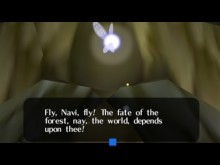 At the beginning of Ocarina of Time we see that Navi is one of many forest fairies serving the Great Deku Tree as personal guardians to the Kokiri, his enchanted forest children. Once paired, they seemingly never leave their child’s side, floating continuously in an orbit above their heads. Link’s lack of a fairy companion at the start of the game sets him apart from his Kokiri friends. Navi, however, stands out just as much as a forest fairy without a Kokiri charge. Why is she still on her own while all the other fairies encountered in Kokiri Forest are with children? Was she deliberately left unpaired to fulfill her destiny as Link’s companion? Why was she chosen out of all the other fairies? Are there actually answers for any of these questions? Obviously the Great Deku Tree must have singled Navi out for a reason. The amount of responsibility he entrusts her with suggests he trusts her more than the other fairies, but why?
At the beginning of Ocarina of Time we see that Navi is one of many forest fairies serving the Great Deku Tree as personal guardians to the Kokiri, his enchanted forest children. Once paired, they seemingly never leave their child’s side, floating continuously in an orbit above their heads. Link’s lack of a fairy companion at the start of the game sets him apart from his Kokiri friends. Navi, however, stands out just as much as a forest fairy without a Kokiri charge. Why is she still on her own while all the other fairies encountered in Kokiri Forest are with children? Was she deliberately left unpaired to fulfill her destiny as Link’s companion? Why was she chosen out of all the other fairies? Are there actually answers for any of these questions? Obviously the Great Deku Tree must have singled Navi out for a reason. The amount of responsibility he entrusts her with suggests he trusts her more than the other fairies, but why?
Because Navi isn’t assigned to a Kokiri child at the start of Ocarina of Time, it isn’t entirely clear what her job was before the game began. One possibility is that she acted as a personal assistant to the Great Deku Tree. She is present and accounted for when the magic tree summons her to fetch Link. She dutifully complies with his request without question, immediately tumbling off towards Link’s House. Later, when it’s revealed that the Great Deku Tree has been cursed by Ganondorf, Navi thinks nothing of braving the dangers of his labyrinth interior to save him. With her by his side, Link is able to conquer his first dungeon, slaying the corruption-spewing Queen Gohma in the process.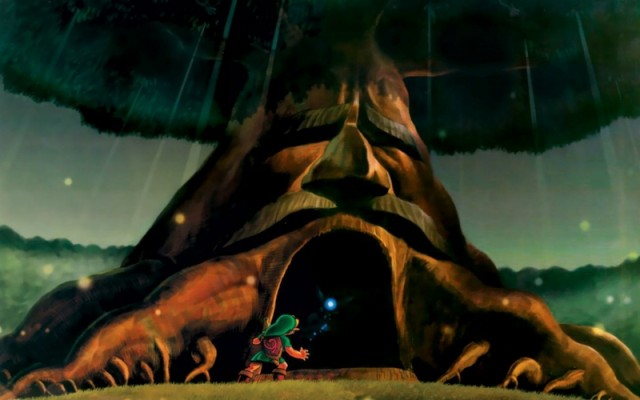
Afterwards, Navi alone is chosen by her dying mentor to accompany the boy hero on his quest. Though she has doubts that a “lazy child” like Link can save the world, Navi never hesitates to fulfill her duty to watch over him. She carries out the Great Deku Tree’s orders even after his death, showing tremendous loyalty towards the ancient guardian. Zelda fans rarely credit Navi with this admirable quality, yet it is undoubtedly one of her defining traits. It establishes the catalyst for why she goes to such great lengths to save Hyrule. In many ways, she has a stronger motivation to go on the adventure than Link does. Her loyalty to the Great Deku Tree compels her to go to great lengths so see his chosen hero succeed.
A boy and his fairy
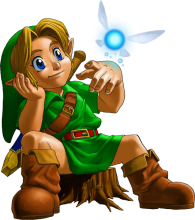 Besides her respect for the Great Deku Tree, we can tell a lot about Navi’s personality through her interactions with Link. In the beginning, her opinion of the boy isn’t exactly shining. She clearly doesn’t fully believe he’s capable of the great tasks set before him, and comes off as a ceaseless nitpicker, constantly nagging Link about what to do. Most Zelda fans don’t consider this persistence of hers as particularly endearing. Being constantly told how to play a game would be annoying enough. The passion with which Navi chimes in to order Link around only makes her a greater pain to some.
Besides her respect for the Great Deku Tree, we can tell a lot about Navi’s personality through her interactions with Link. In the beginning, her opinion of the boy isn’t exactly shining. She clearly doesn’t fully believe he’s capable of the great tasks set before him, and comes off as a ceaseless nitpicker, constantly nagging Link about what to do. Most Zelda fans don’t consider this persistence of hers as particularly endearing. Being constantly told how to play a game would be annoying enough. The passion with which Navi chimes in to order Link around only makes her a greater pain to some.
When one considers the burden the Great Deku Tree entrusted Navi with, however, her impatience with Link (and the player) becomes more understandable. Here she is, trying to guide the chosen hero on a quest to save Hyrule from the clutch of a diabolical desert tyrant, and what is the dumb kid doing? Goofing off! He’s hanging out at a fishing hole, abusing Cuccos, and playing all the mini-games in Hyrule Castle Town over and over again. This is the hero preordained by fate to save Hyrule? If Navi doesn’t get his rear in gear, the kingdom is doomed!
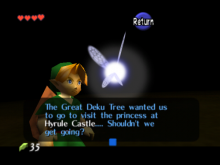 It’s easy to forget when playing Ocarina of Time that the hero we control is only a young boy. Link is at most 10-years-old at the start of the game, and even after a seven year time jump he likely still isn’t close to being emotionally full-grown. It’s realistic that he would need constant guidance on the long trialing journey he is set upon. Sometimes nagging a child a little is necessary, whether it’s to get them to clean their room, take a bath, or save the world from a demonic king of thieves seeking to cover the land in darkness with the power of a sacred artifact. From this point of view, Navi’s nagging can almost be seen as motherly. Sure, she’s still a bit of a pest, but when put in charge of a wayward child it’s impossible to avoid being one from time to time. Everybody is hounded by their parents at some point growing up, and often for a good reason.
It’s easy to forget when playing Ocarina of Time that the hero we control is only a young boy. Link is at most 10-years-old at the start of the game, and even after a seven year time jump he likely still isn’t close to being emotionally full-grown. It’s realistic that he would need constant guidance on the long trialing journey he is set upon. Sometimes nagging a child a little is necessary, whether it’s to get them to clean their room, take a bath, or save the world from a demonic king of thieves seeking to cover the land in darkness with the power of a sacred artifact. From this point of view, Navi’s nagging can almost be seen as motherly. Sure, she’s still a bit of a pest, but when put in charge of a wayward child it’s impossible to avoid being one from time to time. Everybody is hounded by their parents at some point growing up, and often for a good reason.
One point of contention among Zelda fans is the reason why Navi leaves Link’s side at the end of Ocarnia of Time. There are many theories, and naturally some of them don’t paint Navi in a good light. This, of course, is to be expected. The Zelda fanbase is almost never forgiving towards Navi anyway. Her especially ferocious detractors point towards her untimely departure as evidence that she never cared about Link to begin with. This, however, is a gross example of confirmation bias, favoring information that confirms established beliefs. Nintendo has yet to establish why Navi ditched Link. Until they do, it isn’t fair to use this lasting mystery against her. We simply don’t know her state of mind, or if she even had a choice in the matter. Perhaps with her duty to help Link save the world fulfilled, she had to return to the forest from whence she came. There’s even a theory that Navi died at the end of Ocarina of Time, having sustained mortal wounds in the fight against Ganon.
Even though Navi is almost universally derided by gamers, this sentiment is never expressed by any of Hyrule’s fictional denizens. She also, without a doubt, left a strong impression on her former partner. If Navi was really a pest, one might expect Link, the person she pesters throughout Ocarina of Time, to express some kind of annoyance towards her. Although it is difficult to judge Link’s emotions in-game (he never talks and the technology of the time greatly limited his range of facial expression), circumstantial evidence shows his feelings for Navi are opposite those held by popular gaming culture.
The opening to Majora’s Mask clearly spells out that Link developed a close friendship with Navi during his quest to thwart Ganondorf. This shouldn’t come as a surprise. One does not simply go on a peril-filled adventure with someone and come out of it without a strong bond. Nintendo even saw fit to make Link’s connection with Navi the setup for Ocarina of Time’s sequel, in which Link is first seen riding slowly through the Lost Woods searching for a “invaluable friend” who “parted ways” with Link after he fulfilled his heroic destiny. There is no doubt that this quote refers to Navi. Anyone who claims otherwise simply can’t accept that Link cared so much for someone who they consider a blasted ball of annoyance.
Link forming an emotional bond with Navi isn’t surprising given the circumstances of his childhood. After years of being dubbed “the boy without a fairy” Link must have been thrilled to finally have a guardian sprite of his own, someone who he could count on to stay by his side throughout his adventure. Besides Saria, Navi was probably one of his first close friends. Given that he was orphaned at a young age, Navi was also likely the closest person Link ever had to a mother, making his separation from her at the end of the game all the more tragic. Link leaves everything behind to find her: Princess Zelda, Hyrule, and his former home in Kokiri Forest. The poor kid even ends up stumbling into a different parallel reality searching for her. If Navi can inspire this kind of affection and longing in everybody’s favorite hero, surely she can’t be that bad?
A wealth of knowledge
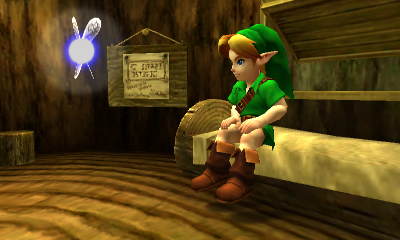 What many Zelda fans miss when complaining about Navi is the true scale of her importance in the game’s structure. Many choose to focus solely on the aggravating aspects of her behavior, forgetting how useful she is in the game overall. Navi’s name (prior to it being ripped off by aliens from a certain James Cameron movie) is a play on the word “navigate,” and navigating the player is exactly what Navi does throughout Ocarina of Time.
What many Zelda fans miss when complaining about Navi is the true scale of her importance in the game’s structure. Many choose to focus solely on the aggravating aspects of her behavior, forgetting how useful she is in the game overall. Navi’s name (prior to it being ripped off by aliens from a certain James Cameron movie) is a play on the word “navigate,” and navigating the player is exactly what Navi does throughout Ocarina of Time.
Hardcore Zelda enthusiasts, having played through Ocarina of Time multiple times, might not appreciate it, but Navi is an immense help to anyone playing the game for the first time. She provides Link with useful information on every enemy in the game, giving newbie players a useful starting point for developing tactics to defeat them. The amount of knowledge this one little fairy possesses is quite impressive. Each enemy in the game, from run-of-the-mill baddies to monstrous beasts dwelling in the deepest dungeon chambers, are common knowledge to her.
Navi also provides Link with frequent information about the world around him; hints about environmental features that aren’t always immediately noticeable. Navi merely gives little nudges in the right direction from time to time. An understandable feature when you consider how unfamiliar many gamers must have been with solving puzzles in 3D when Ocarina of Time launched. Her presence is especially helpful to players coming back to the game after an extended break, providing up-to-date information on the current objective. She also reminds players how certain objects in the environment can be manipulated, such as blocks that react to Link playing the Song of Time. Sometimes she can get a little overeager doing this. Being overly helpful, however, is not a flaw in itself.
It’s easy to see why many Zelda fans aren’t fond of Navi constantly interrupting their game with obvious hints. When in the middle of one of the game’s side quests (or just goofing off) it’s irritating to be constantly reminded about the need to collect the next sage medallion. Imagine if an open world game like The Elder Scrolls V: Skyrim, in which one spends most of their time doing everything except the main quest, harassed the player in a similar manner. It would be unbearable. The mechanic, however, is more forgivable in Ocarina of Time, which is oriented towards a main quest anyway.
Fairy-targeting
Navi’s role in Ocarina of Time isn’t limited to providing information. At the same time she acts as a useful icon through which the player physically navigates the game’s 3D world. Navi’s importance in relation with Ocarina of Time’s revolutionary Z-targeting system, which allows Link to lock onto and interact with items, characters, and enemies in the environment, has long been overlooked. 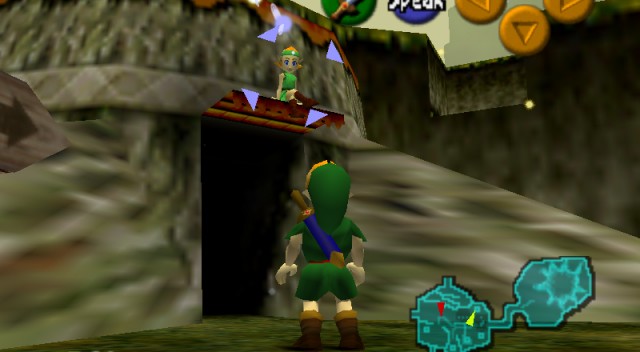
Changing color depending on the type of object she highlights, Navi grants the player immediate knowledge of what they are dealing with. She hovers over distant objects, lending a visual clue to their location. Although the need to have Link’s companion physically highlight selected targets was done away with in future titles, it’s use in Ocarina of Time helped instruct gamers with how to use the new system. It also integrated Navi directly into the gameplay, making her a constant part of the player’s actions. Her involvement in the practical details of Link’s adventure far exceeds most other companions in the series.
Much of the hate leveled at Navi seems to be based on her chirpy voice. When playing Ocarina of Time it’s impossible to avoid hearing her ceaseless cries. Unfortunately, her range of sayings don’t come in much variety, meaning players are subjected to the same simplistic lines as “hey”, “watch out” and “listen” hundreds of times, and yes, it can become rather irritating. It’s ironic that the first use of spoken dialogue in the main Zelda series has attracted so much negativity. With that said, the degree to which someone is annoyed by Navi’s voice work isn’t universal. I personally never had a problem with her lines, as long as they weren’t coming out of her rapid fire.
Final verdict
It’s impossible to ignore Navi’s many faults. She repeatedly states the obvious, chimes in with a grating frequency, and explains concepts that are second nature to most seasoned Zelda veterans. Are there times when I want to tell her to shut up? Yes. Is her advice often only passingly helpful? Definitely. Do I wish she had been left out the the game? Absolutely not.
Claims that Navi is insipid and a terrible companion are nothing but plain hyperbole. Her usefulness and positive character traits outweigh any momentary annoyance she causes. She is an essential part of the game, a compelling character beneath the surface, and, if it even needs to be said, an iconic part of one of the greatest games of all time. Naturally, gamers will always find something to hate about in any game, even one of the best. Nevertheless, Navi couldn’t be as unbearably annoying as she’s made out to be. Her presence spans the entire length of the game she appears in, and yet Ocarina of Time is still considered an ultimate classic. So discard the exaggerated fanboy hatred, and try to appreciate Navi as the memorable character she is. Ocarina of Time wouldn’t be the same without her, and might even have been a game with far less merit.



